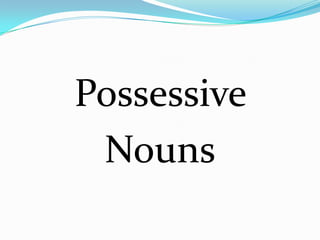
Possessive nouns presentation
- 2. Words that show ownership are called possessive nouns. A noun is possessive if a phrase can be changed to say that an item or idea belongs to someone else. Example:The paintbrush that belonged to the artist was lost. The artist’s paintbrush was lost.
- 3. Possessive nouns are used to show that someone owns something. An apostrophe (') is used to show the ownership.
- 4. Rule To show the possessive of singular nouns add 's. Examples: Fluffy Fluffy’s tail Sally Sally’s recipe the man the man’s hat the teacher the teacher’s pencil
- 5. The possessive form can also show an feature or characteristic. Examples: river river’s edge train train’s wheels sun sun’s heat
- 6. Possessive Nouns Rules 1-2 Rules To show possession of singular nouns add 's. To show possession of plural nouns ending in s add an apostrophe (').Examples:runners => runners' shoes cows => cows' meal trees => trees' apples
- 7. Possessive Nouns Rule 3 To show possession of plural nouns NOT ending in s add an apostrophe and a s (‘s). teeth =>teeth’s fillings children => children’s food
- 8. Plural Possessives If the plural ends in s just add an apostrophe. If the plural does not end in s add an apostrophe and an s.
- 9. the kid’s bike(I kid, 1 bike) the kids’ bike(2 kids, 1 bike) the kids’ bikes(2 kids, 2 bikes)